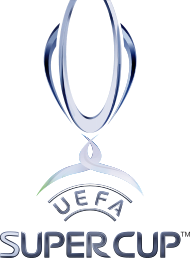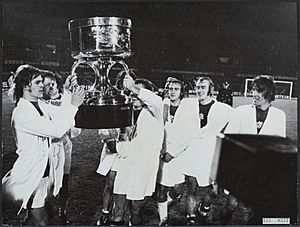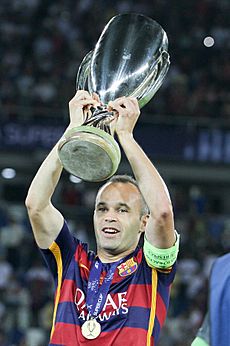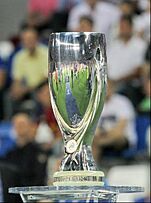UEFA Super Cup facts for kids
 |
|
| Organising body | UEFA |
|---|---|
| Founded | 1972 (official since 1973) |
| Region | Europe |
| Number of teams | 2 |
| Current champions | |
| Most successful club(s) | |
| Website | |
The UEFA Super Cup is a special football match held every year. It's organized by UEFA, the group that runs football in Europe. The game is a showdown between the winners of Europe's two biggest club tournaments: the UEFA Champions League and the UEFA Europa League.
The competition started in 1972. At first, it was a match between the winners of the European Cup (now the Champions League) and the winners of another tournament called the UEFA Cup Winners' Cup. When the Cup Winners' Cup ended in 1999, the format changed. Since then, the Champions League winner has played against the winner of the UEFA Cup (now the Europa League).
The current champions are Real Madrid. They won the 2024 match by beating Atalanta 2–0. Real Madrid also holds the record for the most wins, with six titles.
Contents
History of the Super Cup
UEFA Super Cup Winners
|
Key:
Qualified as UCL winner Qualified as UCWC winner Qualified as UEL winner Abbreviations:
UCL = European Cup / UEFA Champions League UCWC = UEFA Cup Winners' Cup UEL = UEFA Cup / UEFA Europa League |
||
| Season | Winner (between UCL and UCWC winners) |
|
|---|---|---|
| 1973 | ||
| 1974 | ||
| 1975 | ||
| 1976 | ||
| 1977 | ||
| 1978 | ||
| 1979 | ||
| 1980 | ||
| 1981 | ||
| 1982 | ||
| 1983 | ||
| 1984 | ||
| 1985 | ||
| 1986 | ||
| 1987 | ||
| 1988 | ||
| 1989 | ||
| 1990 | ||
| 1991 | ||
| 1992 | ||
| 1993 | ||
| 1994 | ||
| 1995 | ||
| 1996 | ||
| 1997 | ||
| 1998 | ||
| 1999 | ||
| Season | Winner (between UCL and UEL winners) |
|
| 2000 | ||
| 2001 | ||
| 2002 | ||
| 2003 | ||
| 2004 | ||
| 2005 | ||
| 2006 | ||
| 2007 | ||
| 2008 | ||
| 2009 | ||
| 2010 | ||
| 2011 | ||
| 2012 | ||
| 2013 | ||
| 2014 | ||
| 2015 | ||
| 2016 | ||
| 2017 | ||
| 2018 | ||
| 2019 | ||
| 2020 | ||
| 2021 | ||
| 2022 | ||
| 2023 | ||
| 2024 | ||

The idea for the Super Cup came from a Dutch reporter named Anton Witkamp in 1971. At the time, Dutch football teams like Ajax were the best in Europe. Witkamp wanted a new way to prove which team was truly the number one team on the continent.
His idea was for the winner of the European Cup to play against the winner of the European Cup Winners' Cup. However, UEFA did not officially support the first match in 1972. In that game, Ajax beat Rangers from Scotland. Because it wasn't official, some people don't count this as the first Super Cup.
The first Super Cup that was officially recognized by UEFA was in 1973. AC Milan played against Ajax, and Ajax won.
Changes Over the Years
For a long time, the Super Cup was played over two games, one at each team's home stadium. This is called a two-legged format. But sometimes, due to scheduling or political problems, it was only a single match. A few times, in 1974, 1981, and 1985, the Super Cup wasn't played at all.
In 1998, the format changed to a single match at a neutral stadium. This meant neither team had a home-field advantage. From 1998 to 2012, this match was always held at the Stade Louis II in Monaco. Since 2013, the game has been hosted by different cities across Europe each year.
After the 1998-99 season, the Cup Winners' Cup was stopped. So, from the 2000 Super Cup onwards, the match has been between the winners of the UEFA Champions League and the winners of the UEFA Cup (which was renamed the UEFA Europa League in 2009).

Barcelona captain Andrés Iniesta lifting the 2015 UEFA Super Cup trophy.
|
In 2020, the final had to be moved from Porto, Portugal, to Budapest, Hungary, because of the COVID-19 pandemic. This match was special because it was used as a test to allow a small number of fans back into the stadium for the first time after a long break.
The Super Cup Trophy and Prize Money
The winning team doesn't get to keep the real Super Cup trophy forever. UEFA keeps the original, and the winners are given a full-size copy. The winning club also gets 40 gold medals for its players and staff, while the runner-up gets 40 silver medals.
The trophy itself has changed over time. The current version was introduced in 2006. It is the largest of the European trophies, weighing 12.2 kg (about 27 pounds) and standing 58 cm (about 23 inches) tall.
Clubs also get prize money. The winner receives €5 million, and the team that loses the final gets €4 million.
Rules of the Game
The Super Cup is a single 90-minute match. If the score is tied after 90 minutes, the winner is decided by a penalty shoot-out. There is no extra time played.
Each team can have 23 players in its squad for the match, with 11 starters and 12 substitutes. During the game, each team is allowed to make up to five substitutions.
Records and Statistics
Most Successful Clubs
| Club | Winners | Runners-up | Years won | Years runners-up |
|---|---|---|---|---|
| 6 | 3 | 2002, 2014, 2016, 2017, 2022, 2024 | 1998, 2000, 2018 | |
| 5 | 4 | 1992, 1997, 2009, 2011, 2015 | 1979, 1982, 1989, 2006 | |
| 5 | 2 | 1989, 1990, 1994, 2003, 2007 | 1973, 1993 | |
| 4 | 2 | 1977, 2001, 2005, 2019 | 1978, 1984 | |
| 3 | 0 | 2010, 2012, 2018 | — | |
| 2 | 3 | 1998, 2021 | 2012, 2013, 2019 | |
| 2 | 3 | 2013, 2020 | 1975, 1976, 2001 | |
| 1 | 6 | 2006 | 2007, 2014, 2015, 2016, 2020, 2023 |
Individual Player and Coach Records
- Most wins by a player: Dani Carvajal and Luka Modrić have both won the Super Cup 5 times.
- Most wins by a coach: Carlo Ancelotti has won the Super Cup 5 times.
- Most wins with different clubs (player): Mateo Kovačić has won with three clubs: Real Madrid (2016, 2017), Chelsea (2021), and Manchester City (2023).
- Most wins with different clubs (coach): Pep Guardiola has also won with three clubs: Barcelona (2009, 2011), Bayern Munich (2013), and Manchester City (2023).
- All-time top scorers: Nine players are tied with 3 goals each, including superstars like Lionel Messi.
- Fastest goal: Diego Costa scored just 50 seconds into the match in 2018.
- Hat-tricks: Only two players have ever scored a hat-trick (3 goals in one game) in a Super Cup final: Terry McDermott in 1977 and Radamel Falcao in 2012.
See also
 In Spanish: Supercopa de la UEFA para niños
In Spanish: Supercopa de la UEFA para niños
- List of association football competitions
- List of UEFA Super Cup winning managers
- UEFA club competition records and statistics


